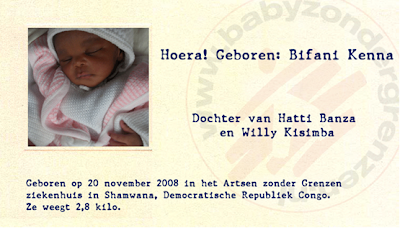
MSF works in 2 hospitals in Shamwana and Dubie, in south-eastern
However, the mother may have to wait a week or more until the traditional healer's visit, thus preventing the baby from receiving the special first breast milk (the colostrum) containing vital nutrients and antibodies a baby needs in its first days of life. As a result, and without the availability of milk formula, this widely practiced tradition has unfortunately led to the death of many newborns in the region.
However, newborn Bifani Kenna – who is named after a former MSF nurse who worked in the Shamwana hospital – is more fortunate. Her parents, Willy (38) and Hatti (25), recognize the importance of beginning breastfeeding immediately after a baby is born. Willy and Hatti have also tried to spread this information informally by talking to other mothers and families, but have met with resistance from other villagers who strongly value this particular custom with the traditional healer.
In order to provide health services to better meet the population’s needs, MSF is also beginning to address this paradox by adapting its programming. In Shamwana, and in other villages where there is a similar concern about some of the negative effects of the customary health-seeking practice, MSF is starting to engage with local traditional healers to establish a positive cooperation. One possible solution, for example, is bringing the traditional healers to the hospital immediately upon the birth of a child to perform the ritual for the breast milk. The challenge facing MSF staff is a delicate balancing act, but one, if achieved, can result in more healthy babies.
During my conversation with Willy and Hatti and as they proudly showed me their newborn Bifani, they asked me to share this significant issue with the wider public to raise awareness of some contradictions which exist between traditional customs and Western medicine, and the dilemmas which regularly occur as a result. Willy and Hatti wish more parents will be able to have a healthy baby like their Bifani
Melissa Ruggles
Melissa was in the
Willy and Hatti are both Congolese nationals who came to Shamwana from other parts of

No comments:
Post a Comment